CREATIVE LEARNING EXPERIENCES THAT CHANGE BEHAVIOR
Father knows best how to keep us human learners from becoming obsolete
Daydreams of an Ideal Future from a Giant of the Past
Lesley
5/25/20253 min read
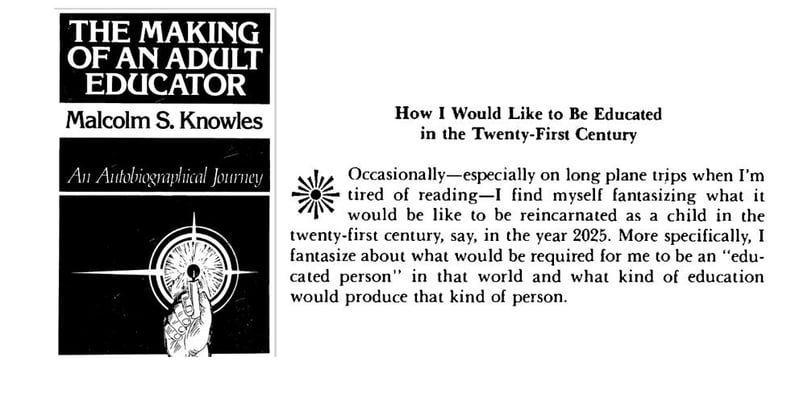

I recently read The Making of an Adult Educator: An Autobiographical Journey (Jossey-Bass Inc., 1989) by the “father” of modern adult learning theory, Malcolm Knowles. In one part, he muses about the consequences of our ongoing knowledge explosion: “What is new, never before experienced by humanity, is an accelerating pace of change, one consequence of which is the quickening rate of obsolescence of human beings.”
Prescient much?
To keep us two-legged from becoming irrelevant, Knowles starts with how we decide that someone is “educated”. He compares what it means to be educated now, which is grounded in the Industrial Revolution, and what it should evolve to:
19th century: Knowledge is power. Transmitting knowledge is the purpose of education. To be considered educated means being someone who is knowledgeable. Implicit objectives: Use grades, sports, and testing to produce people who are competitive, “chauvinistically patriotic”, conformist, and dependent on receiving knowledge dispensed by (and at the whim of) teachers -the "sage on the stage" model.
21st century: Competence is king. Being educated means being competent at anticipating changes in the world, and thus being able to change the world. The highest competence of all is knowing how to engage in continuous lifelong learning that enables you to avoid becoming obsolete.” Implicit objective: Ditch competition in favor of cooperation. Define your worldview far beyond the geographical borders of where you were born by viewing yourself as a global citizen.
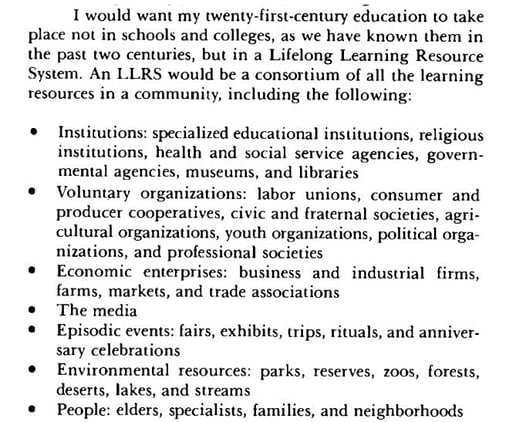

Instead of following a standard school curriculum imposed on them by teachers, lifelong learners would be guided educational diagnosticians. They would be trained in a set of models designed to make us competent at all life’s most important roles, including:
Learner: being competent at reading, communicating, anticipating the future, imagining, inquiring, aspiring, diagnosing, planning, and learning – both getting help and giving it
Unique Self: competence at self-analysis, setting goals, accepting others, being authentic
Friend: how to love, listen, empathize, collaborate, share, help
Family member: staying healthy, sharing, loving, buying & taking responsibility
Worker: career planning, ongoing vocational & professional development; technical upskilling, accepting & providing supervision, delegating, managing, cooperating, and getting along with others
Leisure-time user: competence in appreciating the arts & humanities, playing, relaxing, discovering resources & risking
Cultural Literate: be competent at acquiring & retaining the changing foundation of knowledge & values – the “engine of our culture”
Global Citizen: caring, participating, leading, making decisions, discussing, having perspective (historical & cultural), raising your consciousness, and appreciating other cultures
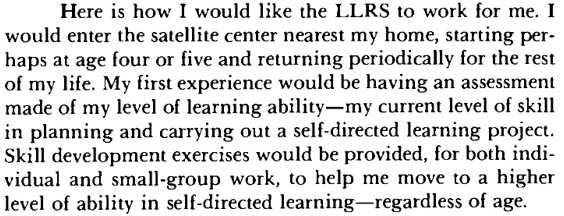

The competencies you study depend on your life stage:
a 3 or 4-year old: first develop competencies in the Friend role, followed by some for Citizen & Learner
Adolescent: begin to focus more on Unique Self, Worker & Global Citizen
Adult: emphasize the roles of Worker, Global Citizen, Family Member, Leisure-time User & Cultural Literate
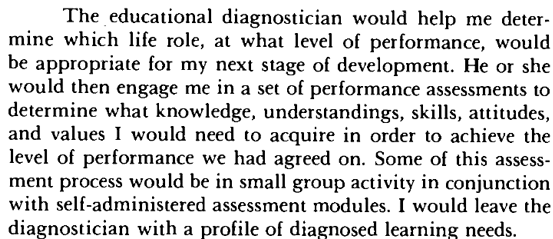

Each time you finish a learning plan, you return to the LLRS to have your learning needs re-diagnosed. And updated. Says Knowles: “In contrast to a linear curriculum, this process can best be described as a "spiral” of learning projects.”

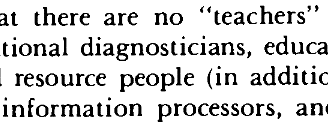
By replacing traditional teachers with content specialists who guide and facilitate the learning journey, we would stop learning so "reactively". Instead, says Knowles, we would learn in a way that is proactive. Self directed. And life-long.
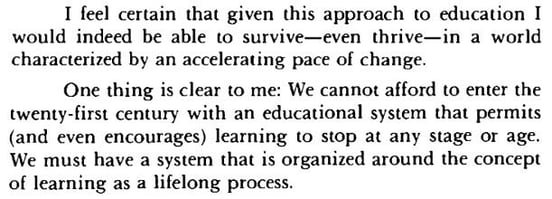

Reading this book felt like Back to the Future - but for Learning Nerds. So good.